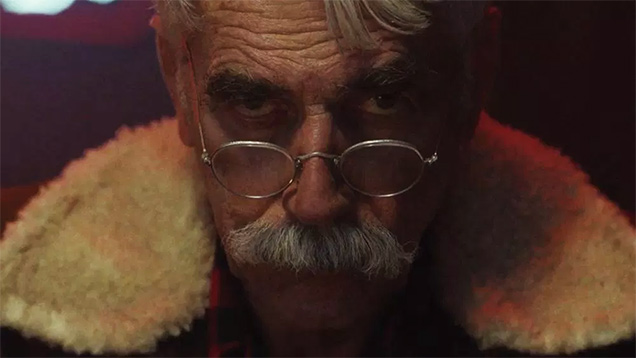The Man Who Killed Hitler and Then the Bigfoot is a singularly weird oddity

Having just arrived on home entertainment, the singularly weird The Man Who Killed Hitler and Then the Bigfoot is not what you might expect. This sober meditation on ageing stars Sam Elliott, who is one of the greatest character actors of all time, says Travis Johnson.
Well, with a title like that you’ve got to give it a shot, don’t you? The Man Who Killed Hitler and Then the Bigfoot, in all it’s deliberately awkward glory, seems to promise something knowingly camp, or at least pulp, and it more or less delivers. But the giddy thrills are leavened with no small amount of pathos – if you can picture a less jokey version of Don Coscarelli’s 2002 cult classic Bubba Ho-Tep, you’re in the right neighbourhood.
Sam Elliott is the Man of the title, Calvin Barr, an ageing loner (apart from his faithful dog, of course) marking time in his comfortable small town rut decades after he assassinated Adolf Hitler in the closing days of World War II. We see his clandestine exploits in a series of flashbacks in which young Calvin (Aidan Turner) infiltrates the Eagle’s Nest with all the B-movie flair you could want. We also see him fumble his romantic relationship with would-be wife Maxine (Caitlin Fitzgerald), which accounts for his late life loneliness.
That loneliness is interrupted when Canadian and American agents (Rizwan Manji and Ron Livingstone) front up to pressgang Calvin into One Last Job – and the second half of the title. It seems that Bigfoot has been responsible for a string of deaths, and ace tracker, outdoorsman, and assassin Calvin is the best candidate to terminate the hairy cryptid with extreme prejudice. And so out grizzled hero sets off into the northern wilderness.
On paper it sounds like a rollicking slice of weirdness that mashes up Inglourious Basterds-style alternative history with In Search Of…-style paranormal nonsense to fun effect. It’s not. Although those elements are in play, writer and director Robert D. Krzykowski downplays them to a large degree, instead delivering a fairly sober meditation on ageing, regret, and the fleeting nature of glory.
Not what you’d expect from a movie that cheerfully invokes both Hitler and Bigfoot in its title, right? In truth, it’s a bit of a bait and switch. The film kind of lures us in promising one thing, and then delivers another, which is basically Sam Elliott in the woods ruminating on where it all went wrong, and where it might still be going.
That’s no bad thing. Elliott is one of the greatest character actors of all time and he’s having A Moment right now, with an Oscar nomination for his turn in A Star is Born following on from good notices earned in the criminally underseen I’ll See You In My Dreams (2015) and The Hero (2017). It’s a pleasure to just see him be, well, him, in much the same way it was a joy to watch Robert Redford be the only living thing on screen for most of All is Lost (2013). That’s the level of charisma and talent at work here.
The film draws some thematic parallels between Calvin and the creature he’s hunting – both are semi-legendary figures now relegated to relative obscurity – but for the most part it plays its cards close to its chest, relying on us to tease out its underlying concerns from the fairly taciturn and understated material at hand. As a result, it may be a little too opaque for some viewers. Similarly, there are about four different genres spinning like plates on sticks in this thing, which may be one too many. The sudden reversals from deadpan weirdness to melancholic reflection take some getting used to, and it’s really only Elliott’s effortlessly magnetic, earthy presence that keeps the whole thing from flying off in some random direction.
Still, these issues are a result of Krzykowski’s formal ambition, and an excess of ambition is easily the most forgivable sin in cinema. The Man Who Killed Hitler and Then the Bigfoot is an oddity, to be sure, but that’s why it’s worth seeking out – we don’t get too many as singularly weird as this, and they should be celebrated.

















